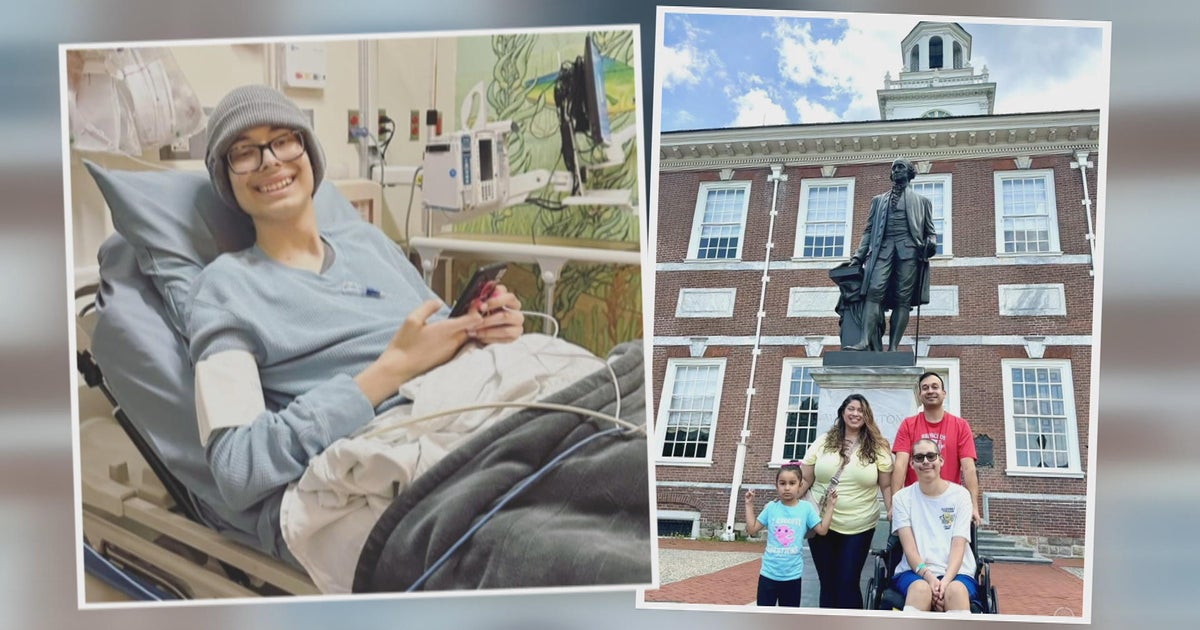New Jersey Vet Gets Back Dog Tag Lost In France During WWII
NEWARK, N.J. (AP) — Carol Wilkins leaned over the side of her father's wheelchair and handed him the small red box, a heart-shaped cutout revealing its contents: a weathered, bent silver dog tag.
"Oh, Daddy, look," Wilkins exclaimed as her 90-year-old father opened it, his eyes beaming and smile wide. "They're back."
Sixty-nine years after losing his dog tag on the battlefields of southern France, Willie Wilkins reclaimed it Wednesday after a trans-Atlantic effort to return it to him. It started more than a decade ago in a French backyard and ended with a surprise ceremony in Newark City Hall.
"I am so happy," Carol Wilkins said. "You don't know what joy is on my heart for what you have done for my father."
In August 1944, Willie Wilkins was an Army corporal fighting in the Allied invasion of southern France. Amid the horrors of battle, Wilkins's job was one of the grimmest. A quartermaster, Wilkins was responsible for removing and identifying the bodies of dead American servicemen and having them buried or transported back to the United States.
At some point during the invasion, Willie Wilkins's silver dog tag slipped off his neck.
"It could have been an arm, it could have been a hip that dragged it off, because he was picking up dead bodies," Carol Wilkins said. "He said it was horrible. Blood everywhere. Parts. All he knew was to pick up those bodies for the family members of dead soldiers."
Willie Wilkins returned to Newark and worked on an assembly line. He was a happy man who doted on his only daughter, but his service as a quartermaster took a toll. He had a nervous breakdown and post-traumatic stress disorder and retired at age 44, his daughter said.
Willie Wilkins would sometimes talk about his war experience, especially when Carol was young, mentioning that he lost his dog tags. He and his family were convinced the small medallion would remain a tangible piece of the history of the invasion, buried somewhere in what were once the bloody battlefields of Provence.
In a backyard 4,000 miles away from Newark in Istres, France, Anne-Marie Crespo was tilling the soil around an olive tree on a spring day in 2001 and found the dog tag.
She hit a small piece of metal stamped with a name and numbers. She brought it inside, cleaned it and tried to straighten out the tag's bend, only to break it slightly.
Crespo knew the tag belonged to a soldier and kept it on a bookcase shelf. She presumed the soldier died on the battlefield, and held a ceremony to honor Wilkins and other American war dead.
"I often thought of this poor soldier dead for FRANCE + FREEDOMS," Crespo later wrote in a letter to Carol Wilkins.
Crespo showed the "treasure" she found in the backyard to visitors. One took photos of the dog tag and sent them to her brother, Philippe Clerbout.
Clerbout posted the pictures in an online history forum. He got a reply from the National Archives and Records Administration in Washington, D.C., which said Wilkins joined the military on Dec. 31, 1942, in Fort Bragg, N.C.
Clerbout became a man with a mission: finding Willie Wilkins.
His quest to help an American soldier was personal. Clerbout's father was a prisoner in Germany from June 1940 until the camp was liberated in 1945. He returned to France with American troops and married Clerbout's mother.
Clerbout sent emails to anyone he thought could help, from the White House to media outlets. A woman from the U.S. Department of Veteran's affairs in Minneapolis located Willie Wilkins in Newark.
Carol Wilkins thought the phone call was a prank. It was the woman from Minneapolis, asking for her father's honorable discharge number because someone found his dog tag.
Carol Wilkins didn't believe the woman and insisted on calling her back. The call was legitimate.
"I said, Daddy, Daddy, Daddy," she said, "They found your dog tags."
The GI Go Fund, a Newark nonprofit that connects veterans with services and helps them make the transition to civilian life, brought them to New Jersey.
Newark Mayor Cory Booker presented the Wilkinses with the dog tag on Wednesday, Victory in Europe Day. Bertrand Lortholary, the Consul General of France, attended.
Carol Wilkins plans to display the tag in a case on her father's dresser. Willie Wilkins has been in a rehabilitation facility and suffers from Alzheimer's Disease and other ailments.
When asked if he ever thought he would see his dog tag again, Willie Wilkins shook his head.
"I never did," he said.
(© Copyright 2013 The Associated Press. All Rights Reserved. This material may not be published, broadcast, rewritten or redistributed.)



